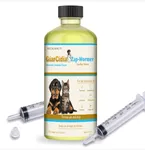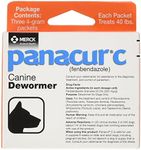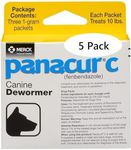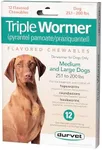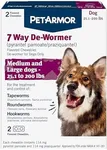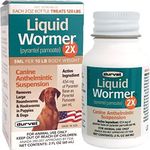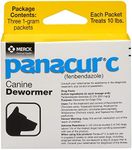Buying Guide for the Best Liquid Dewormers For Dogs
Choosing the right liquid dewormer for your dog is crucial for maintaining their health and well-being. Dewormers help eliminate internal parasites that can cause various health issues. When selecting a liquid dewormer, it's important to consider several key specifications to ensure you pick the best fit for your dog's needs. Understanding these specifications will help you make an informed decision and keep your furry friend healthy and happy.Active IngredientsThe active ingredients in a dewormer are the chemicals that target and eliminate specific types of worms. This spec is important because different ingredients are effective against different parasites. Common active ingredients include pyrantel pamoate, fenbendazole, and praziquantel. If your dog has been diagnosed with a specific type of worm, choose a dewormer with an ingredient known to target that parasite. For general prevention, a broad-spectrum dewormer that covers multiple types of worms may be ideal.
Spectrum of EfficacyThe spectrum of efficacy refers to the range of parasites that the dewormer can treat. This is important because some dewormers are only effective against certain types of worms, while others can treat a broader range. Narrow-spectrum dewormers target specific worms like roundworms or tapeworms, while broad-spectrum dewormers can handle multiple types. If your dog is at risk for various parasites, a broad-spectrum dewormer is a better choice. For targeted treatment, a narrow-spectrum dewormer may be more appropriate.
Dosage and AdministrationDosage and administration refer to how much of the dewormer you need to give your dog and how it should be administered. This is important because proper dosing ensures the effectiveness of the treatment and minimizes the risk of side effects. Liquid dewormers often come with a dosing guide based on your dog's weight. Make sure to follow the instructions carefully. If your dog is difficult to medicate, look for a dewormer that is easy to administer, such as one that can be mixed with food.
Age and Weight RestrictionsAge and weight restrictions indicate the suitability of the dewormer for dogs of different ages and sizes. This is important because puppies, adult dogs, and senior dogs may have different tolerances and needs. Some dewormers are specifically formulated for puppies, while others are suitable for adult dogs. Always check the product label to ensure it is appropriate for your dog's age and weight. If you have a puppy, choose a dewormer that is safe for young dogs. For larger breeds, ensure the product can be dosed accurately for their size.
Frequency of TreatmentThe frequency of treatment refers to how often you need to administer the dewormer to keep your dog parasite-free. This is important for maintaining ongoing protection against worms. Some dewormers require a single dose, while others need to be given over several days or repeated periodically. Consider your schedule and your dog's lifestyle when choosing a dewormer. If you prefer a low-maintenance option, look for a product that requires less frequent dosing. For dogs with higher exposure to parasites, a more frequent treatment schedule may be necessary.
Side Effects and SafetySide effects and safety refer to the potential adverse reactions your dog might experience from the dewormer. This is important to ensure your dog's well-being during treatment. Common side effects can include vomiting, diarrhea, and lethargy. Always read the product label and consult with your veterinarian if you have concerns about side effects. Choose a dewormer with a good safety profile, especially if your dog has a history of sensitivities or health issues. Monitoring your dog after administration can help you catch any adverse reactions early.


